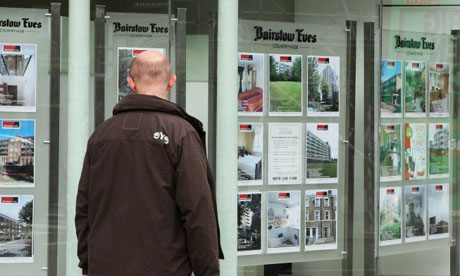
Photo: Graham Turner
What's the price of entry into the housing market for a first-time buyer? The answer: a deposit of at least £20,000 - which is why so few people are now buying. If you want one of the best mortgage deals on offer, you are probably looking at having to rustle up a £50,000 deposit, or even more in London and the south-east.
While Alistair Darling this week claimed his pre-budget package of support for housing would "help the homeowners of tomorrow buy their first home", there was nothing in his speech to assist first-time buyers to overcome the substantial obstacle of stumping up a hefty deposit.
Latest Council of Mortgage Lenders figures show that the average first-time buyer is putting down a deposit of 16% of the value of the property - which equates to a whisker under £20,000 in the case of a typical £124,400 property being bought by a first-timer.
However, a review of the home loans on offer this week reveals that banks and building societies are reserving their best rates for customers with a 40% deposit. Based on the above example, that translates into £50,000: not a problem for some homeowners looking to hop on to a new mortgage deal but impossible for all but a minority of first-time buyers. That £50,000 figure is for the UK as a whole; it would be much higher in most of London and the south-east.
However, there are many who say that now is not the time for first-time buyers to be wading into the property market because house prices probably have some way further to fall. Sitting on the sidelines may be the best course of action. But some will feel they have waited long enough.
At first glance, the mortgage rates on offer at the moment do not look too bad. HSBC is offering a base-rate tracker deal - which follows the ups and downs of the Bank of England base rate - at 3.99%, while Abbey and Alliance & Leicester have two-year fixed rate deals at 4.49%. But in both cases, the maximum loan is 60% of the property's value - which means the buyer must put down the other 40%.
"If the borrower has a 20% deposit, rates rise to 5.99% for trackers and to 6.45% for fixed rates. If the borrower only has a 10% deposit, then there are no trackers and the lowest rate for a fixed deal is 6.45%," said Francis Ghiloni at the home loans website mform.co.uk.
The mortgage landscape has changed dramatically in recent months, and among those affected the most are those who can only manage a very small deposit, or none at all. All the remaining 100% mortgages were axed earlier this year, and there is little, if anything, available for those who have a deposit smaller than 5%.
Another problem facing first-time buyers is the greater caution of banks hit by the credit crunch about whom they take on as customers.
Meanwhile, some lenders are clamping down on low-cost "interest-only" mortgages, which many people have turned to in the past as a way of affording high property prices. With these, customers pay interest on the loan but do not pay off any of the capital debt - which means much lower monthly payments.
Earlier this year, Abbey said interest-only borrowers with "a proven repayment vehicle in place" would be able to borrow up to 75% of a property's value, while those without evidence of a repayment vehicle would be limited to 50%.
source: the guardian
link to the original post:
http://www.guardian.co.uk/money/2008/nov/26/first-time-buyers-homes-mortgages
Fort Lauderdale Blog and Real Estate News
Rory Vanucchi
RoryVanucchi@gmail.com
http://waterfrontlife.blogspot.com
www.FortLauderdaleLiving.net


